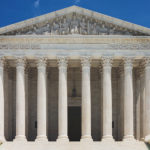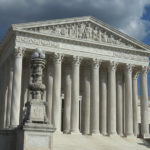In a unanimous decision, the U.S. Supreme Court ruled Philadelphia cannot exclude Catholic Social Services from its foster care program because the agency does not place children in same-sex households.
In Fulton v. City of Philadelphia, the court ruled the city’s refusal to contract with the Catholic agency for foster care services unless it agreed to certify same-sex couples as foster parents violated the First Amendment.
Buckner International issued a statement expressing its pleasure the court “upheld the free exercise clause of the First Amendment and affirmed Americans can still find solutions that work for everyone.”
“This unanimous decision ensures Buckner is able to continue to serve vulnerable children in accordance with our deeply held, biblically based religious convictions,” the statement from Buckner reads.
“There are more than 400,000 children in foster care across the country, and there is a great need for every capable childcare provider, including those inspired by faith. There is room for all of us to work together as part of the solution, and because of this, we will continue to treat all people with respect and refer same-sex couples to the many agencies who will place with them. We take seriously our spiritual calling to serve vulnerable children according to our interpretation of biblical principles.”
‘Little resemblance’ to public accommodations
Chief Justice John Roberts, writing an opinion joined by five other justices, said Philadelphia’s anti-discrimination ordinance that deals with “public accommodations” does not cover the charitable work of Catholic Social Services. Certification as a foster parent is not something broadly accessible to the public, he noted.
“It involves a customized and selective assessment that bears little resemblance to staying in a hotel, eating at a restaurant or riding a bus,” Roberts wrote.
The government must provide religious exemptions if it offers exemptions for other purposes and is able to achieve its goals through other means, he continued.
Catholic Social Services “seeks only an accommodation that will allow it to continue serving the children of Philadelphia in a manner consistent with its religious beliefs; it does not seek to impose those beliefs on anyone else,” Roberts wrote.
Sign up for our weekly edition and get all our headlines in your inbox on Thursdays
‘Nondiscrimination provisions often protect religious liberty’

Amanda Tyler, executive director of the Baptist Joint Committee for Religious Liberty, found Roberts’ approach to the case “somewhat surprising, because there was no evidence that the city had ever granted an exception or that Catholic Social Services had asked for one.”
The BJC joined a friend-of-the-court brief on behalf of the city of Philadelphia, along with the president bishop of the Episcopal Church, the General Synod of the United Church of Christ and the Evangelical Lutheran Church.
“The court’s decision does not require religious exemptions in all future cases involving government contracts and nondiscrimination policies. That is a good thing because nondiscrimination provisions often protect religious liberty in government services,” Tyler said.
“It is disappointing that the court rejected the city’s compelling interest in the equal treatment of prospective foster parents and foster children, particularly in the context of government contracts voluntarily entered into by religious contractors.”
‘Win for religious freedom’
Daniel Patterson, acting president of the Southern Baptist Convention’s Ethics & Religious Liberty Commission, called the court’s ruling “a decisive 9-0 win for religious freedom.”
“The government has many God-given duties, but punishing a group for its theology is emphatically not one of them,” Patterson said.
He emphasized the court’s decision “prohibits no one from serving children—it simply ends state discrimination against religious groups.”
“We must all remember what matters most is caring for children. If the government boxes out religious organizations and prohibits them from providing foster care and adoption services, the net effect is a massive shortage of available homes,” Patterson said. “Children in need should not be collateral damage in a culture war.”
The ERLC had filed a friend-of-the-court brief arguing the city of Philadelphia infringed on the free exercise rights of Catholic Social Services. Others joining the ERLC in that brief included the Alliance Defending Freedom, the Family Research Council and Focus on the Family.
Kristen Waggoner, general counsel for the ADF, applauded the court’s decision.
“Every child in need of a forever home deserves the chance to be adopted or cared for by a foster family. That’s what it means to keep kids first. The Supreme Court’s decision today allows that to continue happening,” Waggoner said.
“The government can’t single out people of certain beliefs to punish, sideline or discriminate against them. We’re grateful for the good decision today consistent with that principle.”
Ruling based on narrow grounds
Contrary to the expectations of some observers, the Supreme Court did not overturn Employment Division v. Smith, a 1990 decision in which the court held the First Amendment’s free exercise clause does not require exemptions to neutral laws that incidentally burden religion.
Rachel Laser, president and CEO of Americans United for Separation of Church and State, voiced disappointment in the court’s decision but noted the ruling was narrowly framed and did not grant a “sweeping free pass” to “religious extremists.”
“Nine justices could agree on this decision because it was so narrow. The court concluded that because Philadelphia allowed individualized exemptions from its nondiscrimination requirements in its foster care program, it had to exempt Catholic Social Services,” Laser said.
“Significantly, the court declined to rewrite the First Amendment to grant a broad license to discriminate in the name of religion. The court also acknowledged the importance of nondiscrimination laws and specifically respected the dignity of LGBTQ people. … The vast majority of Americans believe our laws should not allow anyone to use their religious beliefs to harm others—and certainly vulnerable children in foster care.”













We seek to connect God’s story and God’s people around the world. To learn more about God’s story, click here.
Send comments and feedback to Eric Black, our editor. For comments to be published, please specify “letter to the editor.” Maximum length for publication is 300 words.